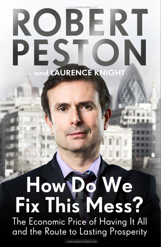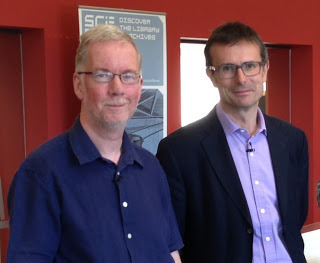Brian Clegg's Blog, page 113
August 19, 2013
Fiscal Cliff
 As a popular science writer I have always had a second (working) life as a business creativity trainer. It's not uncommon for people in the field to have a second activity - apart from anything else, if you spend your whole working life teaching people to be creative and don't do anything creative yourself, you will soon lose your mojo.
As a popular science writer I have always had a second (working) life as a business creativity trainer. It's not uncommon for people in the field to have a second activity - apart from anything else, if you spend your whole working life teaching people to be creative and don't do anything creative yourself, you will soon lose your mojo.A while ago, creativity expert Peter Cook invited me to do some training at one of his Open University events. In my case the 'bit on the side' of writing has taken over to be my primary activity, but Peter keeps his rock musicianship more firmly in check, despite using it directly in his training. But he has recently given it full rein by producing a rock song on the financial crisis that manages to be a little ironic (never a bad thing), thought provoking and a damn good bit of music too.
I'll be quite honest, I listened to it on YouTube out of friendship - but that's not enough to make me part with cash. I bought a copy because I liked it.
See what you think:
If you do like it, I encourage you to buy a copy in the hope we can make this unusually relevant rock song visible in the charts. You can get it at Amazon or of course from iTunes:
Published on August 19, 2013 01:46
August 16, 2013
Subscription monarchy
 A picture I took as the Queen passed Lancaster University in 1977I have always been suspicious of those who want that excellent institution the BBC to switch from being funded by licence fee to subscription, but I am coming round to it, because I think I would be hypocritical to argue otherwise given what I'm about to say.
A picture I took as the Queen passed Lancaster University in 1977I have always been suspicious of those who want that excellent institution the BBC to switch from being funded by licence fee to subscription, but I am coming round to it, because I think I would be hypocritical to argue otherwise given what I'm about to say.The other night I was watching Steven Fry's TV programme on the City of London. All the places were very interesting, but people like the Lord Mayor, beadles and livery companies, dressed up in their silly pantomime costumes really got up my nose. Or rather, I thought it's fine, as long as we don't have to pay for it. As far as I'm aware, the livery companies are self-funding, and if that's the case, and as long as they keep it behind closed doors, I'm delighted for them to prance around in silly robes and share loving cups and such. However, my suspicion is that the Lord Mayor's antics (not Boris, the pantomime Lord Mayor of the City of London) are paid for by taxpayers or ratepayers, and that is not on. At least, not without any choice in the matter.
I feel the same about royalty. I know I'm in a 20% minority, but I'd get rid of the lot of them. Not in a revolutionary, guns at dawn sense, simply get rid of the institution and stop paying for it. However because I am in a minority, perhaps a better answer for royalty (and the Lord Mayor) is exactly the same proposal that is often put forward for the BBC. Let's move away from having a licence fee for royalty and go to a subscription basis. If you want the royals, you pay for them. If you don't want them, you don't pay.
Of course those who pay need to get something in return. Free entry to a raffle to go to a garden party or something. A royal channel on Sky. But I think it would make the situation fairer. Moaners like me couldn't complain about taxpayers money being wasted on these chinless wonders (not to mention the one who peddles homeopathy and such), but those who want them can pay to keep their antics.
Of course, we might find that those who are all in favour become less so when they have to sign up for their direct debit. But perhaps I am being cynical. I'm sure they will feel it's worth every penny.
Published on August 16, 2013 00:34
August 8, 2013
Einstein's molecular dance
 It's that time again when posts will get a little more sparse as the holidays kick in. Just time for a little sciencey piece on one of Einstein's sometimes overlooked achievements from his annus mirabilis, 1905.
It's that time again when posts will get a little more sparse as the holidays kick in. Just time for a little sciencey piece on one of Einstein's sometimes overlooked achievements from his annus mirabilis, 1905.Atoms are like small children – they are never entirely still. It’s a remarkable contrast between the visible world, and the world of the very small. Look at a glass of water. That water appears to be motionless, yet within the liquid the water molecules are frantically dancing around.
In 1827 a Scottish botanist called Robert Brown was trying to understand plant pollination. On a microscope slide he had the pollen grains of an evening primrose plant suspended in a drop of water. When he peered through the microscope, the tiny specks of pollen jumped about, constantly in motion.
What was particularly puzzling was that there seemed to be no order to the motion, no rules for the way they moved. Instead the pollen grains’ dancing was wild, chaotic, quite different from the picture of the world as a clockwork universe, built on Newton’s laws.
When Robert Brown first saw Brownian motion he suspected it was the life source of a plant in action. It was only when he tried long-dead pollen, then stone dust and soot, finding the same effect with particles that were never alive, that he confirmed that the size of the pollen grains was responsible for their motion.This jerky dance was named Brownian motion, but remained little more than an oddity until Albert Einstein linked it to the behavior of atoms.
Einstein produced three great papers in 1905. His work on relativity and the photoelectric effect (one of the foundations of quantum theory) get the glory, but his third great paper was on Brownian motion. At least two other scientists explained Brownian motion at the same time as Einstein. Scottish-Australian scientist William Sutherland published a similar paper in 1904, but has been forgotten in the enthusiasm for Einstein’s work. Similarly, Polish scientist Marian von Smoluchowski devised a parallel explanation to Einstein’s, published in 1906, written well before he read Einstein’s paper. The timing of these papers reflected a growing understanding of matter.
Until that time, the concept of atoms was very theoretical. It's hard to believe now, but many thought they were a fiction to make calculations work. However, Einstein showed that the dance of the pollen grains was caused by the random impact of billions of water molecules, with the grains moving much as the molecules did, but vastly amplified in size. Einstein used Brownian motion to show that the liquid the grains floated in was composed of many billions of gyrating molecules.
It wasn’t until 1912, with the completion of a wide range of experiments based on Brownian motion, that French physicist Jean Perrin firmly established the existence of atoms. Until then, many scientists denied they existed.
Image from Wikipedia
Published on August 08, 2013 01:24
August 7, 2013
How Microsoft got tablets wrong. Again.
 Make me cheap!Although we think of Microsoft as a software company they have had some big hits on the hardware front. The Microsoft mouse was, for years, the definitive pointing device. I used Microsoft's ergonomic keyboards for a long time before discovering for reasons I don't understand that Apple's straight version doesn't give me the same strain as a typical keyboard. And, of course, the X-box has done pretty good business. But Microsoft has not been lucky with tablet computing.
Make me cheap!Although we think of Microsoft as a software company they have had some big hits on the hardware front. The Microsoft mouse was, for years, the definitive pointing device. I used Microsoft's ergonomic keyboards for a long time before discovering for reasons I don't understand that Apple's straight version doesn't give me the same strain as a typical keyboard. And, of course, the X-box has done pretty good business. But Microsoft has not been lucky with tablet computing.They first went wrong with their early attempt at creating a touchscreen standard. It gave us that excellent piece of software OneNote, but the hardware never took off. No one could see why anyone would want to buy a tablet when they could have a real computer. Then Apple showed the world exactly why they wanted one - and the world changed. So when Microsoft came back to the market with the Surface they should have had it easy. They had an excellent, touchscreen-oriented operating system that would run legacy programs (if you had the right version of the hardware). And a neat design. What could possibly go wrong?
At the time of writing the price of Surface tablets is being heavily discounted for the obvious reason that they simply aren't selling. We now all understand why we want a tablet - but we want it to be an iPad or and Android device, and we need a fair amount of persuading to go for something else. And the MS sell just isn't working. I think Microsoft has one hope, but I don't think they will see it. Certainly the usually spot-on industry website The Register didn't in this piece on the price cuts.
Simon Sharwood, the author of the piece, comments 'One small ray of sunshine is that the price cut may not be permanent.' But I'd say that's bad news, not a ray of sunshine. I think Microsoft's only hope for the Surface was not keep it premium priced, but to make it really cheap. It's the Polaroid strategy. Polaroid used to practically give away their cameras, because they made all their money from the film. You can still see this sales model operated today by printer manufacturers who sell printers ridiculously cheap considering what sophisticated devices they are, because they expect to make their money from the consumables. (I once had a colour laser printer where a set of cartridges was more expensive than buying the printer (with a set of cartridges) in the first place.)
Of course 'consumables' are a very different business with a tablet than with a printer or Polaroid camera. They are less essential, so you have to make sure that it's attractive and very, very easy to upgrade your software (something, let's face it, Microsoft knows all about with Office), to buy new apps and to buy little add-on hardware gadgets and widgets. But given that, there is no reason why Microsoft couldn't sell Surfaces mega-cheap for ever. That way, they'd have a chance of surviving against the might of the aluminium clad opposition.
Published on August 07, 2013 01:39
August 5, 2013
Reclaiming Carmina Burana
 Here's that wheel of fortune in the original
Here's that wheel of fortune in the original(image from Wikipedia)For many people, Carl Orff's unique choral piece Carmina Burana is nothing more or less than 'that music they use on X-Factor.' I suspect the X-Factor producers or Simon Cowell or whoever chose it simply think of the opening/closing chorus of the piece that they use for dramatic effect as a bit of loud imposing background, not realizing just how appropriate it is for TV shows like this. That particular chorus is about the wheel of fortune. How one day you are up on a high - but then the wheel turns again and nothing has really changed.
When I was a student I loved this piece. What student wouldn't if you take a look at what it means. It is based on a collection of often bawdy but sometimes romantic poems by medieval monks, obsessed, as only monks and students can be (though in rather different ways), with drinking and sex. Musically there is nothing quite like it (certainly not Orff's two attempts to do something similar) and it contains huge contrasts in the different sections. If you have only ever heard that chorus O Fortuna it really is worth persevering and taking in some of the rest.
The thing that makes it for me is the ending of the piece, which puts it in my top three pieces of music that make the hairs on the back of your neck stand up. The last few segments portray, well, the climax of the whole business. There is a glass-cracking soprano solo as she gives her all, followed by a triumphant chorus, glorying in the outcome. But here is where the tingle factor comes in. Right at the end of this chorus, when the music seems to be coming to a dramatic climax, it turns. Something shifts and what should have been a triumphant ending suddenly opens up like a void... into a reprise of the opening chorus about the wheel of fortune turning and things always being the same. I found the implications of this rather unpleasant as a romantic youth, but you can't argue with the genius of the way those bars of music are constructed.
If all you know of Carmina Burana is the loud, blaring opening O Fortuna, here's a rather beautiful contrasting bit where the female character is deciding whether or not to go for it.
Published on August 05, 2013 00:27
August 2, 2013
Why we're in the financial mess we are
 One nice side effect of my encounter with the BBC's Robert Peston the other day was that he kindly gave me a copy of his latest book, How Do We Fix This Mess - and I am very grateful that he did.
One nice side effect of my encounter with the BBC's Robert Peston the other day was that he kindly gave me a copy of his latest book, How Do We Fix This Mess - and I am very grateful that he did.Like, I suspect a lot of people, I have struggled to understand just how the banks got into the mess they did, what is happening to try to untangle it, what is going on in the Eurozone and more. And thanks to this book I now have a much better feel for what it's all about. It's the sort of thing that is very difficult to put across on the TV news, requiring a more detailed, sprawling approach possible in a book, and Peston really does make things a whole lot clearer. He also makes it clear that there hasn't been enough done to prevent this happening again - the regulatory system still encourages the bankers to dream up byzantine mechanisms to get around the rules and increase their bonuses.
What's more as a bonus (the acceptable face of the bonus) there's an explanation of the whole LIBOR scandal business - and an in-depth analysis of China's finances and why there is a lot of potential for problems there too. Of course, you have to have an interest in current affairs/business and finance to find this as fascinating as I did, but it is important reading if you want to get on top of this crucial world situation affecting all our livelihoods.
One thing Robert Peston is famous for is his rather strange, drawling intonation (oddly this was less obvious when we were discussing quantum physics) and the book does have an equivalent in a habit of far too often saying 'In other words' or 'Put simply this means' or something similar. Time and again he will make a statement and then re-state it in simple terms. (He actually does this twice in a single paragraph at one point.) Usually the restatement is valuable, and sometimes having both versions helps because one uses the terminology you often hear but don't understand and the other clarifies - but it does happen far too often. I also ought to mention Laurence Knight who appears in very small letters on the front - he presumably co-wrote the book, so part of the acknowledgement for an excellent bit of work should go to him.
If you were baffled by the credit crunch, banking behaviour, the Eurozone crisis or any combination thereof and want to know more, this is definitely the book for you. You can see it at Amazon.co.uk.
Published on August 02, 2013 02:59
August 1, 2013
Peston physics
 After the shootA couple of weeks ago I had the very enjoyable experience of spending a couple of hours in the company of the BBC's business editor, Robert Peston. In a series of five short pieces, Robert has been finding out more about a number of things that have fascinated him but eluded him over the years. He has learned to do Punch and Judy, to paint a landscape and to order his Chinese takeaway in Mandarin. And I had a go at teaching him quantum physics. We met at the Science Museum Library at Wroughton near Swindon, a location I had suggested as a good sciencey backdrop.
After the shootA couple of weeks ago I had the very enjoyable experience of spending a couple of hours in the company of the BBC's business editor, Robert Peston. In a series of five short pieces, Robert has been finding out more about a number of things that have fascinated him but eluded him over the years. He has learned to do Punch and Judy, to paint a landscape and to order his Chinese takeaway in Mandarin. And I had a go at teaching him quantum physics. We met at the Science Museum Library at Wroughton near Swindon, a location I had suggested as a good sciencey backdrop.Although it was a bit slow going as anything with a camera involved tends to be - and I'm rather sad at just how much as ended up on the cutting room floor - I think it went pretty well. See what you think:
Published on August 01, 2013 01:44
July 31, 2013
Loving Youview
 I have long been an enthusiast for Freeview+, the Freeview equivalent of Sky+ without the unseemly act of putting cash in the pocket of Rupert Murdoch, but to be honest, the first generation of Freeview PVRs was usable but a bit poor on user interface. However we have just upgraded to a Youview box and it is absolutely brilliant.
I have long been an enthusiast for Freeview+, the Freeview equivalent of Sky+ without the unseemly act of putting cash in the pocket of Rupert Murdoch, but to be honest, the first generation of Freeview PVRs was usable but a bit poor on user interface. However we have just upgraded to a Youview box and it is absolutely brilliant.What do you get for those hard earned pennies? Of course there are the usual PVR features - pause live TV, record two programmes at the same time, record a whole series with one click... But that's just for beginners. Firstly, the Youview box has a beautiful user interface. Clear, crisp text, good structure and an attractive, intuitive remote. Second you get the main 4 channels in HD. And then the biggies. You have the catchup services of all 5 main channels (plus Dave) on tap on a proper TV. (If you really can't resist giving money to Rupert you also access Sky's Now TV sport/movie service.)
But most delightful of all, the electronic programme guide goes back a week as well as forward. Of course you can still use the iPlayer (say) interface if you want catch up on a whole series, but to watch something you missed yesterday or at the weekend you can simply flip back on the guide and press play and it magically digs the show up for you. Brilliant. And as icing on the cake there's an iPhone app where you can set a programme to record wherever you are if, for instance, you hear about an interesting new show while at work.
And every time you watch you can think I'm not paying to see this. The box I got was the 1Tb Humax although the 500 Gb equivalent is a particular bargain on Amazon.co.uk at the moment. There are other Youview boxes, but this struck me as the best balance of cost and capacity.
Published on July 31, 2013 02:09
July 29, 2013
Who knows cellulose?
Cellulose acetate, anyone?
 Ever wonder why old movies were dangerous? Not so much for the content of the storyline, but because they were made from a substance that was highly inflammable. Originally they were based on nitrocellulose - guncotton. Not exactly something you want to run through a hot projector with an arc lamp. But a much safer version of film would keep projectionists happy for many years: cellulose acetate.And there's a lot more to this early naturally based plastic, from the original Lego bricks to gas mask eyepieces.Time for a touch of plasticity: hurry over to the RSC compounds site to see more on this clear winner. If you'd like to listen straight away, just click here.
Ever wonder why old movies were dangerous? Not so much for the content of the storyline, but because they were made from a substance that was highly inflammable. Originally they were based on nitrocellulose - guncotton. Not exactly something you want to run through a hot projector with an arc lamp. But a much safer version of film would keep projectionists happy for many years: cellulose acetate.And there's a lot more to this early naturally based plastic, from the original Lego bricks to gas mask eyepieces.Time for a touch of plasticity: hurry over to the RSC compounds site to see more on this clear winner. If you'd like to listen straight away, just click here.
Published on July 29, 2013 01:40
July 26, 2013
Found in translation
 It's interesting that in the Clegg household, we have never watched so many subtitled programmes in languages other than English than we are at the moment. Common enough in continental Europe, broadcasting this way in the UK has always been seen as a non-starter. The natives will be restless, thought the broadcasters.
It's interesting that in the Clegg household, we have never watched so many subtitled programmes in languages other than English than we are at the moment. Common enough in continental Europe, broadcasting this way in the UK has always been seen as a non-starter. The natives will be restless, thought the broadcasters.I think what made the change was the Danish series The Killing (originally Forbrydelsen). We love our murder mysteries over here, but The Killing broke the mould. Where a UK show would feature one or more murders in each one hour or two hour programme, the first series of The Killing took a leisurely 20 hours of programming to examine the impact of a single murder. We saw vastly more of how ordinary lives were changed by what had happened. And we also saw in Sarah Lund a police officer main character who frankly made rather a lot of mistakes. Add in the parallel track of political intrigue and the slightly exotic, familiar-yet-not-familiar nature of Denmark and it was a surprise winner.
The success of this programme in the UK made programmers sit up and take notice. And it made audiences - at least in the chattering classes, who perhaps had dipped their toes into foreign language films (who doesn't love Amelie?) - realise that it was worth the investment of concentration. Because, of course, subtitles kill the ability to do other things while you watch. It's difficult to fiddle with Facebook, because as soon as you miss the screen you lose all meaning (unless it's one of those strange sudden bursts of Danish that sound almost entirely like their English equivalent).
So, at the moment, we are getting our doses of foreign (as it were) from the second series of The Killing, avidly watched from Netflix, and the hugely atmospheric French drama The Returned about to reach its climax on Channel 4. What will be next, I wonder?
Image from Wikipedia
Published on July 26, 2013 01:36



